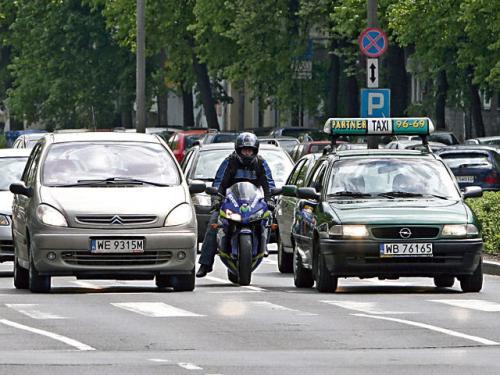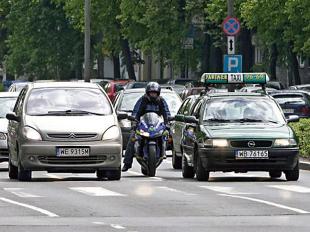
The driver through the eyes of a psychologist
 Interview with Dorota Bonk-Gyda, Head of the Department of Road Transport Psychology at the Transport Institute.
Interview with Dorota Bonk-Gyda, Head of the Department of Road Transport Psychology at the Transport Institute.
The Department of Road Transport Psychology is the leading institution in the country dealing with issues related to the behavior of road users. 
What is the subject of detailed research work?
Dorothy Bank-Gaida: The Department of Psychology of Road Transport of the Motor Transport Institute deals with the analysis of the psychological causes of road accidents and accidents. We pay special attention to the scientific study of the behavior of drivers in terms of their functioning in traffic conditions, ranging from typical behavior through the influence of factors that violate the safety of travelers, and ending with events that threaten the life and health of its participants.
One of the directions of our analysis is also the psychological characteristics of young drivers as frequent perpetrators of road accidents - (18-24 years old). In addition, in the department we deal with undesirable situations, i.e. phenomena of aggression on the roads and intoxication of drivers of vehicles. Thanks to the experience and cooperation of our team with psychological laboratories from all over Poland, we are able to perform various types of analyzes in a wide range. In return, we get a unique source of information about the behavior and habits of local drivers. I want to note that we are the only research institution in Poland that develops methods of psychological research of drivers, and the publications of the department are unique publications in the field of transport psychology.
The importance of our unit is confirmed by the fact that the psychological examination of drivers can only be carried out by a psychologist with the qualification of a specialist, confirmed by an entry in the records maintained by the voivodeship marshals. Therefore, in order to popularize knowledge in the field of road safety, the staff of the department is actively involved in the training of psychologists who want to get a qualification by conducting theoretical and practical classes with graduate students in the field of transport psychology. Another form of training is seminars and specialized training. Recipients, among others Regional traffic police, forensic experts, transport psychologists.
Do the studies conducted at the ZPT lab and their results confirm the popular belief about the bad habits of Polish drivers and their banal bravado?
Scientific research conducted at the department objectively presents certain phenomena through a detailed analysis of the attitudes and motives of drivers. The results are intended to debunk social myths about traffic, such as the effect of alcohol on efficient driving. As scientists, we oppose the pitting of road users, such as car drivers against motorcyclists, because our goal is above all to promote safe habits and spread the principles of a culture of driving and mutual respect on the road.
The analysis of psychological phenomena in transport allows us to indicate the possibilities of influencing the improvement of road safety. On an individual basis, each driver undergoing examination in the psychological laboratory of the Department, after testing, receives recommendations on how to improve the comfort of functioning in traffic, taking into account their own strengths and weaknesses. We also often consult with doctors (ophthalmologists, neurologists) to correctly assess the absence or presence of contraindications to driving as part of prevention in a given person.
Is it possible to assess, based on the analysis of the collected research results, where aggression in traffic comes from?
The Department's activities also include the creation of training and retraining programs for specific groups of drivers or transport professionals. The educational activity of the department also contributes to the popularization of the results of our research at scientific conferences and seminars. We analyze the population of Polish drivers in terms of their specific psychological characteristics, including the propensity for risky behavior in traffic.
We try to spread our knowledge by actively participating in social campaigns, for example by warning against drunk driving or by directly addressing young drivers and their behavior on the road. And finally, through our activities, we try to reach out both to road safety specialists and to a wide range of drivers, both professional and amateur, including through the media, providing expert assessments that explain the causes and consequences of specific actions on road.
Is it possible, in the light of current regulations, to exclude persons who do not have a predisposition to drive a vehicle before becoming a driver?
The current legal regulations on the psychological tests of drivers impose this obligation on a certain group of respondents. Such tests are mandatory for drivers (trucks, buses), carriers, taxi drivers, ambulance drivers, driving instructors, examiners and doctor-appointed driver candidates.
The study also covers persons forcibly referred by the police for examination. These are: the perpetrators of an accident, drivers detained for drunk driving or exceeding the limit of demerit points. Our department develops methods for psychological tests of drivers, i.e. sets of tests and guidelines necessary for the correct and accurate diagnosis of the above driving vehicles. Unfortunately, we only check candidates for drivers in Poland with a doctor's referral. Therefore, we do not have a legal opportunity to influence novice drivers, and they are the culprits of many accidents (drivers 18-24 years old).
As a result, driver's licenses are often issued to people who know the operator's driving rules, but may be emotionally immature, socially inept, hostile and competitive, or overly fearful and therefore potentially dangerous. The absence of psychological tests of candidates for drivers means that the right to drive a vehicle is granted to persons with emotional and psychological problems. Another important shortcoming of Polish legislation is the lack of mandatory examinations of the elderly and the elderly. These drivers often pose a threat to themselves and others, because they are not able to correctly assess their own predisposition to driving.
If they volunteer for research, they can learn a lot of valuable information about their own limitations, which will make it easier for them to decide whether or not to continue driving on their own. In my opinion, the introduction of mandatory testing of driver candidates and persons over XNUMX years old would greatly increase the awareness of these people and would significantly reduce the number of road hazards created by these groups of drivers.
The obligation to carry out periodic checks of fitness to drive should extend not only to persons who drive vehicles for profit, but also to all persons involved in road traffic, i.e. also to drivers of passenger cars, motorcyclists, etc. traffic accidents are the fault of drivers of all types of vehicles, and a systematic fitness test will play a preventive and educational role through the individual guidance of a traffic psychologist.
 Dorothy Bank-Guide, Massachusetts
Dorothy Bank-Guide, Massachusetts
Head of the Department of Psychology of Road Transport at the Road Transport Institute in Warsaw.
She graduated from the Faculty of Psychology at the University of Cardinal Stefan Wyshinsky in Warsaw. Graduate of Postgraduate Studies in Transport Psychology. In 2007 she completed her doctoral studies in economics at the University of Entrepreneurship and Management. Leon Kozminsky in Warsaw. The psychologist is authorized to conduct psychological tests of drivers.